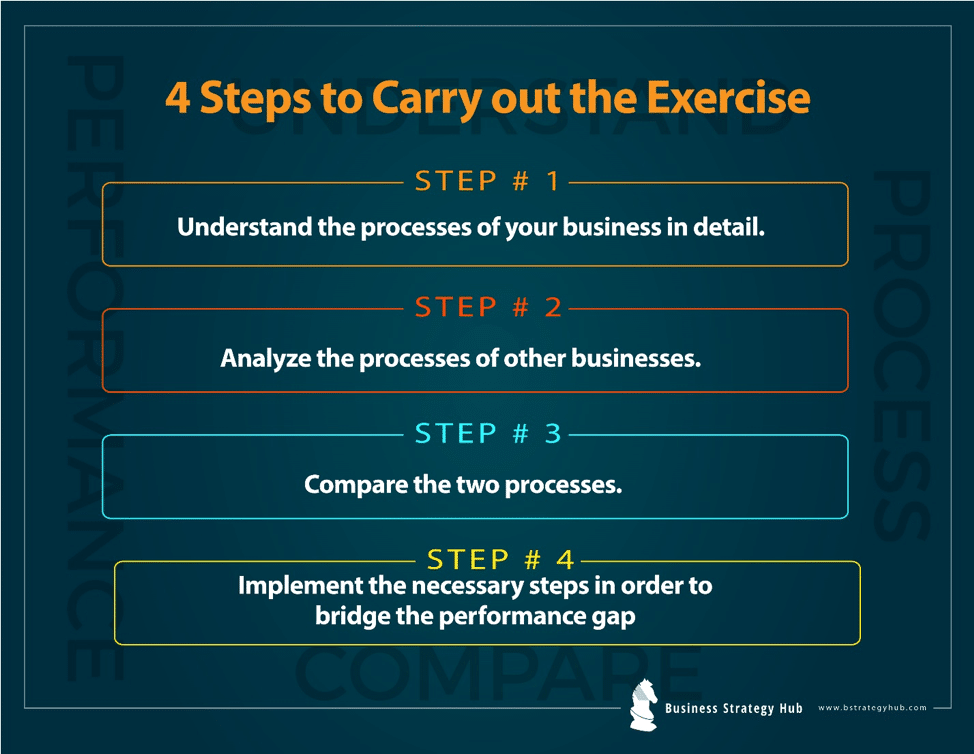Model Name : Benchmarking
Creator : Dr. Robert C. Camp
Year : 1989
Purpose : To understand and analyze the existing position of business for best practice | To determine areas and means of performance enhancement.
Improving the performance of your workforce would automatically improve the performance of your organization, enhancing your position in the market. But how?
The answer is quite simple: benchmarking!
Benchmarking entails looking outside a particular business or region to analyze how others attain their performance levels and to comprehend the processes they use. It helps explain the factors and processes behind the outstanding performance.
But, hey, wait! This is not all!
The lessons you learn from this benchmarking exercise need to be applied appropriately; otherwise, the entire exercise would go in vain!
The lessons learned to facilitate enhanced performance in critical functions within a company or crucial areas of a business.
Steps involved in benchmarking process
Want to be effective? Avoid considering benchmarking as a one-off exercise!
Benchmarking in business must be an integral part of a continuing enhancement process.
Types of Benchmarking
Here is an overview of the various types of benchmarking with examples:
1. Strategic Benchmarking
Want to boost the overall performance of your business? Well, this is the kind of benchmarking you should use.
Strategic benchmarking analyzes general approaches and long-term strategies that have facilitated high-performers to be successful.
It entails considering high-level facets such as developing new products or services, core competencies and boosting capabilities for handling the changes in the external setting.
Variations resulting from strategic benchmarking may be challenging to execute and may take longer to materialize.
What is it most applicable for?
Strategic benchmarking is the most suitable for re-aligning business strategies that have become inappropriate.
2. Performance or Competitive Benchmarking
This kind of benchmarking is used when businesses consider their position for performance characteristics of critical services or products.
Benchmarking partners are sought from the same market segment. Performance or competitive benchmarking is often carried out through third parties or trade associations to protect confidentiality.
What is it most applicable for?
It is most relevant and appropriate for evaluating the comparative level of performance in important activities or areas in contrast to others in the same sector and identifying ways of bridging the performance gaps.
3. Functional Benchmarking
Functional benchmarking entail businesses looking to benchmark with partners sought from various areas of activity or business sectors to determine ways of refining similar work processes or functions.
This, in turn, can result in novelty and dramatic improvements.
What is it most appropriate for?
Functional benchmarking is the most suitable for enhancing services or activities for which counterparts are not likely to be existent.
4. Process Benchmarking
Are you focusing on enhancing key operations and processes? Well, process benchmarking is what you need to opt for!
In this kind of benchmarking, the benchmarking partners are drawn from the best practice organizations that carry out similar nature or work or deliver similar services.
Process benchmarking entails creating process maps to assist analysis and comparison. It, however, often results in temporary benefits.
What is it most appropriate for?
Process benchmarking is most suitable for achieving enhancements in key areas or processes to get instant benefits.
5. External Benchmarking
External Benchmarking entails analyzing factors outside the businesses that are recognized as the finest in class. It provides learning opportunities from businesses at the leading edge.
It can, however, consume a significant amount of time and resources to ascertain the comparability of information and data, the development of the comprehensive recommendations, and the authenticity of the findings.
What is it most appropriate for?
When instances of best practices can be found in other companies, and there is a lack of good practice within the organization, the need for external benchmarking arises.
6. Internal Benchmarking
This kind of benchmarking entails benchmarking operations or businesses from the same organization. For instance, one company having business units in various regions or countries.
Internal benchmarking has three main advantages:
- Access to sensitive information and data is easier,
- Standardized information or data is readily available and;
- Typically, fewer resources and less time are needed.
When it comes to internal benchmarking, you will experience fewer barriers to execution as practices may be comparatively easy to transfer within the company.
True novelty may be lacking though, and the likelihood of finding the best practice is higher through external benchmarking.
What is it most appropriate for?
Internal benchmarking is appropriate when several business units of the same company demonstrate good practice, and the management decides to transfer this practice across the organization, swiftly.
7. International Benchmarking
Best experts are identified and examined elsewhere in the world! This is probably because there are very few benchmarking partners within the same region or country to generate reliable results.
Advancement in IT and Globalization are growing opportunities for global projects. These may consume more resources and time though, for set-up and implementation.
Hence, the results may require careful scrutiny due to national disparities.
What is it most appropriate for?
International benchmarking is relevant where the target is to attain world-class status, or merely because of inadequate “countrywide” businesses against which to benchmark.
Benefits of Benchmarking
If you are trying to be at the leading edge by enhancing your performance, try benchmarking!
- It really helps you to focus on the best practices of your competitors.
- Enables you to obtain comprehensive comparisons between businesses.
- Allows for consorting of information.
To Wrap Up
Most businesses are more than eager to talk over their success.
Now that you know what benchmarking is, you don’t need to re-invent the wheel!
Benchmarking helps you to enhance your organization or business by using verified methods that have already been established.














Add comment